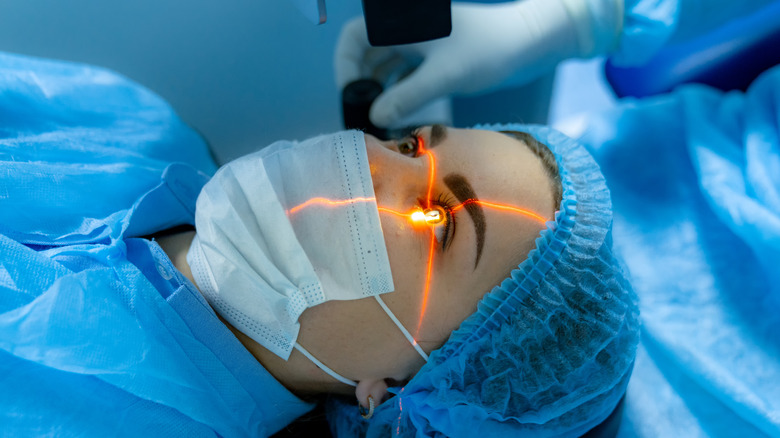What To Expect After Cataract Surgery
Our eyes are crucial for one of our most important senses. Although some of us might enjoy perfect vision early in our lives, our eyes may begin to develop cataracts as we age. According to the Mayo Clinic, cataracts can interfere with our quality of life as they impair our ability to read, drive, or read facial expressions. However, people can regain their vision and quality of life through cataract surgery.
In an interview with Health Digest, Preeya K. Gupta, M.D., Managing Director of Triangle Eye Consultants in Raleigh, North Carolina, explains how cataracts occur and what patients can expect from this procedure. Gupta is also an Alcon consultant and an Adjunct Associate Professor of Ophthalmology at Tulane University School of Medicine.
Gupta tells us that about 25 million people in the United States get cataracts. "When we're young, the natural lenses in our eyes are clear," Gupta says. "But in our 40s, proteins start to break down and clump together in our eyes." These clumps cloud our vision, but cataract surgery replaces the natural lens with an artificial lens.
What cataract surgery entails
Cataract surgery might sound scary, but Gupta reminds us that technology has made it safe. The procedure itself is outpatient and takes about 15 minutes.
"[W]e make two small incisions within the eye, and then we use ultrasound technology to break up the cataract. Once we remove the cataract and lens, we implant an artificial lens / IOL [intraocular lens] in its place," Gupta said.
Cataract surgery can significantly improve your vision even compared to before you had cataracts. "With modern technologies like the Vivity IOL, patients not only obtain excellent distance vision after surgery but also have better near and intermediate vision — and they may not need to wear glasses as much after surgery, even if they had astigmatism prior," Gupta said.
This could mean that you might no longer need to wear glasses. She suggests talking to your doctor about different options as there might be some risks involved.
What to expect after cataract surgery
Although cataract surgery is outpatient, Gupta says some patients might receive sedation to calm any anxiety. If this is the case, you shouldn't drive for 24 hours after the surgery.
All patients should avoid lifting heavy objects for at least a week because it puts pressure on the eye. Any swimming should be avoided for three to four weeks so that you don't infect the eye. You'll likely be given eye drops for a few weeks to help heal the eye, reduce inflammation, and avoid infection.
At first, Gupta says you might not be able to notice the improved vision. "The first couple of days the pupil might be slightly dilated, so you may not feel like you are seeing perfectly but within five to seven days, most patients will see a significant improvement in day-to-day vision. A small percentage of patients may take two to four weeks for the eye to fully heal."
And no, you won't have to wear an eye patch. Instead, Gupta gives her patients a clear protective shield to wear at night for five to seven days to prevent infection.
Side effects and when to call the doctor
Gupta says that you could experience some dryness or irritation that might feel like you have something in your eyes. This will go away in a few weeks, and the eye drops will help. Some lenses might cause you to see a glare or halo with lights at night.
"One other potential side effect that is not common is seeing a little shadow or darkness called a dysphotopsia which should also go away within several weeks," Gupta says. "Thankfully for most patients this symptom goes away over time."
Gupta advises calling your doctor as soon as possible if you have sudden vision changes, eye pain, or redness because your eyes could be infected. "If you experience flashes of lights associated with floaters or black spots and loss of peripheral vision, this could be a sign of a retinal tear or detachment and you should call your doctor immediately," Gupta added. Although she says these are rare, you should seek immediate medical care.
To find out about lens options for cataract surgery, head to the Alcon website. You can also find out more about Dr. Gupta and other eye services at the Triangle Eye Consultants website.




